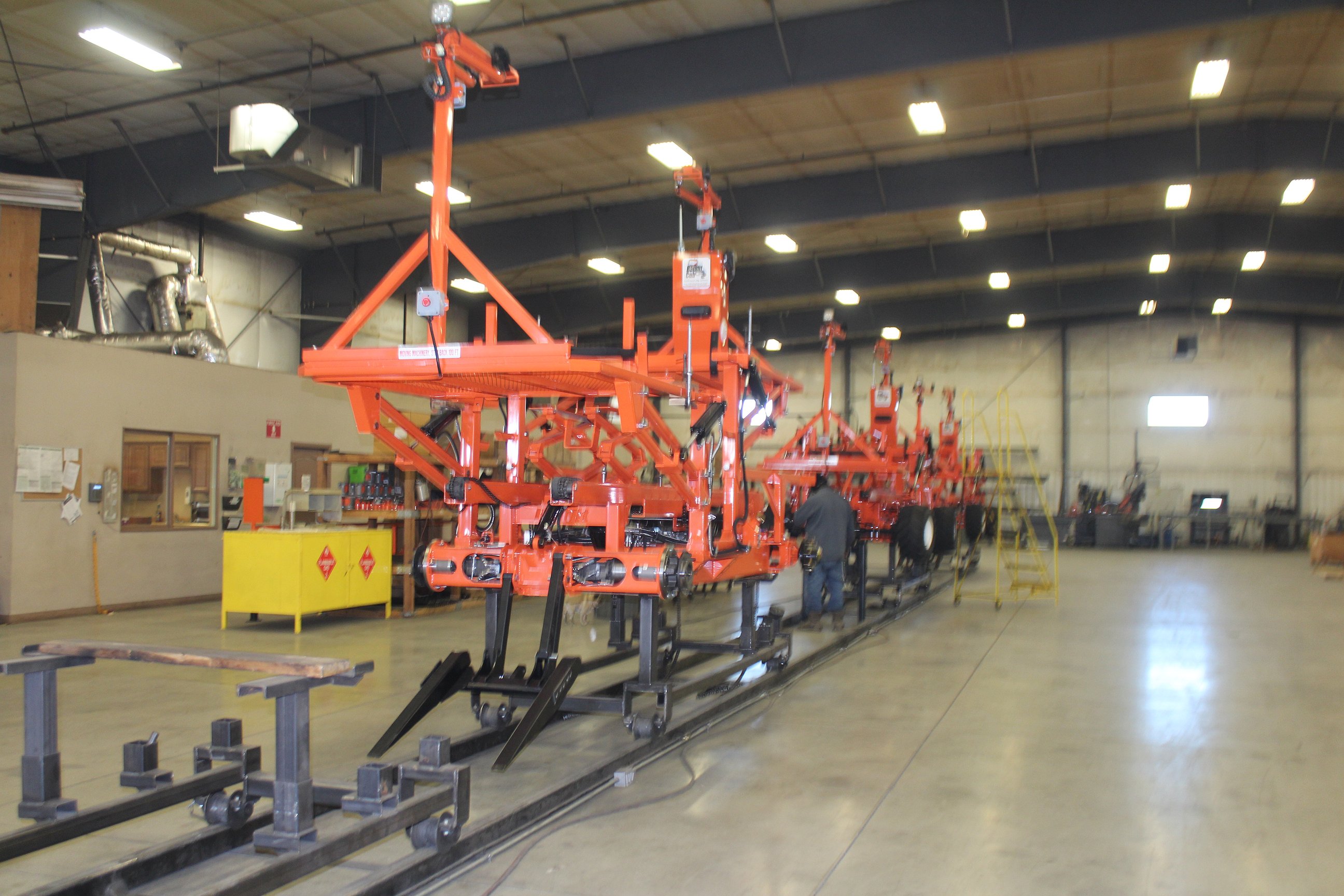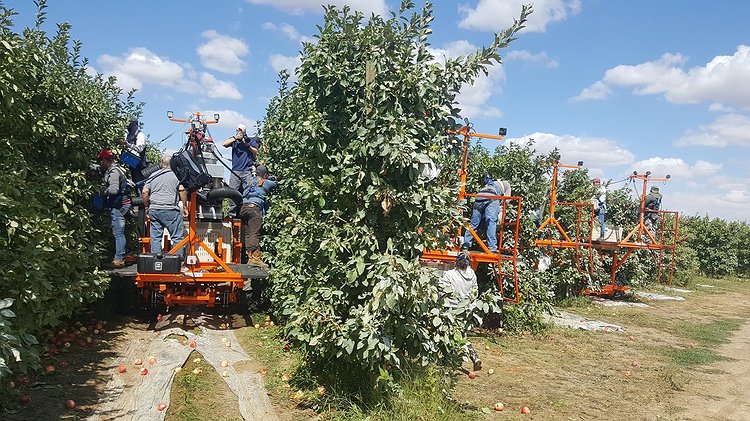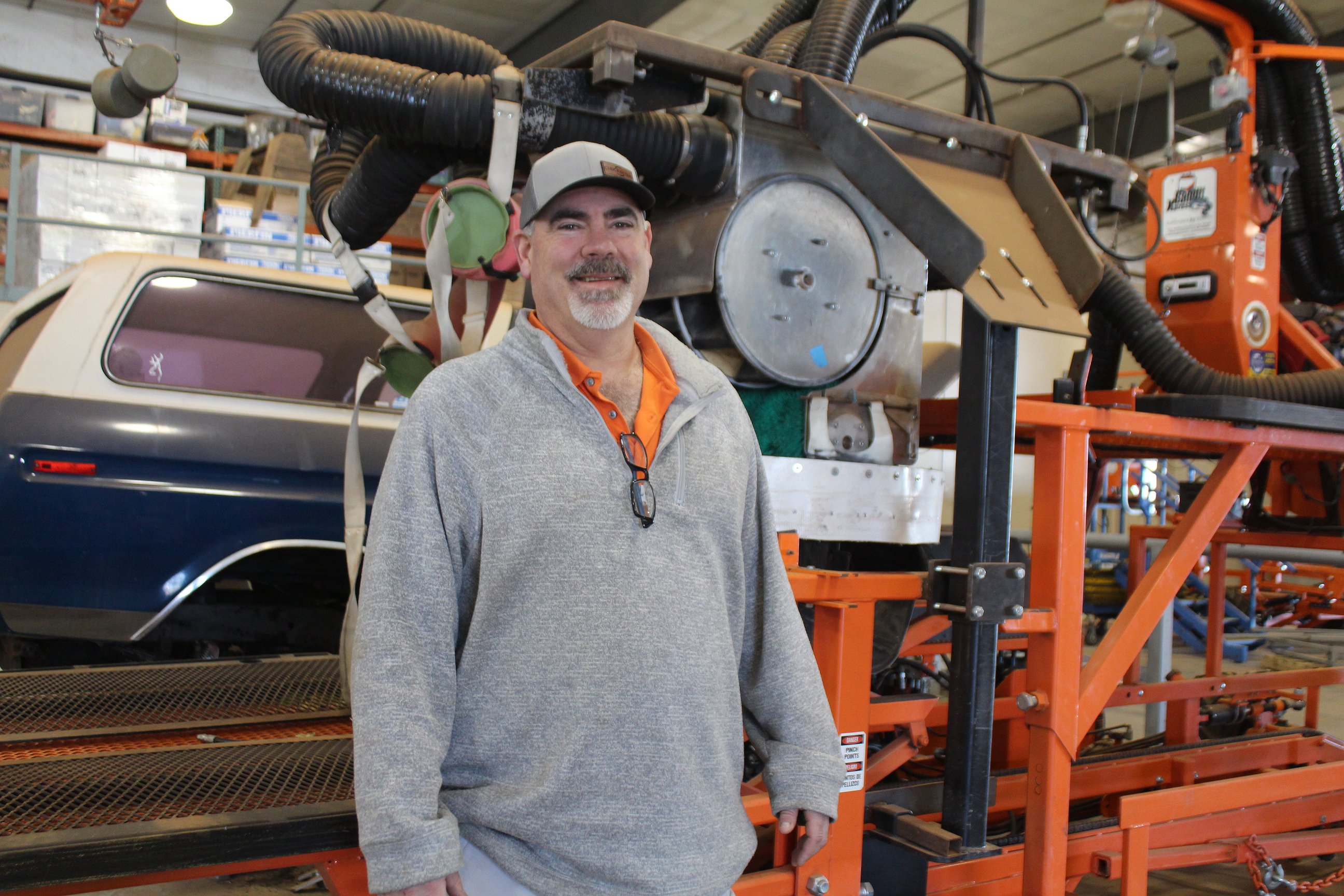Automating agriculture: Experimentation, innovation keys to Moses Lake company’s business in evolving apple industry
CHERYL SCHWEIZER | Hagadone News Network | UPDATED 9 months, 3 weeks AGO
Senior Reporter Cheryl Schweizer is a journalist with more than 30 years of experience serving small communities in the Pacific Northwest. She began her post-high-school education at Treasure Valley Community College and enerned her journalism degree at Oregon State University. After working for multiple publications, she has settled down at the Columbia Basin Herald and has been a staple of the newsroom for more than a decade. Schweizer’s dedication to her communities and profession has earned her the nickname “The Baroness of Bylines.” She covers a variety of beats including health, business and various municipalities. | April 3, 2024 1:00 AM
MOSES LAKE — Automated Ag owner JJ Dagorret said the theory behind the equipment his company sells is very simple.
“Extremely simple, almost like a lawn mower or a log splitter type of thing,” he said.
What the equipment is designed to do doesn’t sound that simple. Named the Bandit, the machine must provide a stable platform for the workers picking apples or pears, with platforms at different levels for different sections of the tree. An onboard lift allows the bin to follow the pickers, and to be deposited on the ground when it’s full. It has to stay level on the often-bumpy ground of the orchard, and it’s got onboard controls and auto steering capability.
Sure. Sounds simple.
Dagorret said it’s the evolution of equipment to match the evolving orchard. Growing apples has moved away from trees with a large trunk in favor of high-density plantings; trees are much smaller and supported by a trellis.
“(The grower’s) focus is on growing fruit and not developing a tree,” he said. “Everything is managed so we can optimize the growth process.”
Dagorret’s background is in developing machinery to harvest commodities like pistachios, which aren’t damaged when they’re shaken from a tree. He experimented with that technology in orange groves in Florida, but that, he said, turned out to be the wrong approach.
“Citrus for the store has to be hand-picked. Olives have to be hand-picked. Apples have to be hand-picked,” Dagorret said. “Because we can’t bruise.”
There was, and is, another difference between the needs of the guy growing apples and the guy using a shaker to harvest almonds.
“With those types of machines, you need support for them. You need a service truck, and you need a shop, and you need a mechanic, and you need these things. But in the apple industry, there are blocks of fruit out there that there’s not even a shop to work out of, or a mechanic. And the equipment that is there is simple stuff. It’s a tractor, it’s a mower, it’s a spray rig. And those are all real simple things - they don’t require a lot of maintenance,” he said.
“So coming into this industry, I recognized right away that there was no support for the equipment. So that’s when I decided that to build these machines, I wanted to keep it extremely simple,” he added. “Kind of the key to it was to make something anybody could work on, and then we can diagnose problems, essentially, over the phone.”
Even though the goal was to keep it simple, development took about six years, he said. He got a product he was satisfied with just about the time the COVID-19 pandemic hit. Automated Ag made it through the supply disruptions, although the aftershocks are still affecting his business, he said.
The Bandits come in a couple of sizes to fit various orchard (and field) configurations, and they’re designed to be useful through the entire production season.
“We use it as a harvest aid, but it’s also an aid for tree maintenance, pruning, thinning, tying, all the development of the trellis system, pretty much anything you used to do on a ladder you would do on a machine now,” Dagorret said.
And that’s one of the goals, to get ladders out of the orchard.
“We have companies with no ladders in the field because the ladder is our biggest problem with people getting hurt. And it’s less efficient,” he said.
Harvest has evolved, with growers going back through the orchard multiple times to pick fruit as it ripens at different levels of the tree. Other entrepreneurs have built equipment that blows leaves off the trees, increasing the sunlight getting to the middle and bottom tree limbs.
“This is all development in the last five, 10 years,” Dagorret said. “So we’ve gone from 2,000 years of essentially using a ladder to climb up into a tree - we went overnight to platform harvesting,” he said.
Harvest keeps evolving, and Dagorret has developed equipment that uses a suction system. It’s in the testing phase in 2024, with production planned for 2025.
“Instead of having a bag that we’re picking all this fruit into, we have a hose that we pick the fruit and we drop it in the hose and it sucks it in, and we have a bin filler,” he said. “We’ve done all this inside of 10 years.”
Perfecting the bin filler wasn’t easy.
“That was a huge nightmare challenge,” he said. “How do we get a round piece of fruit in a bin filler that has a round distributor into a square box and fill the corners and fill it evenly without bruising it all? That was the giant challenge,” he said. “And I’ve been working on that for six years now, and last year, we finally got it perfected.”
A lot of farm jobs that used to be done by humans are now done by machines, but picking tree fruit is still done by hand. Dagorret said entrepreneurs, including Automated Ag, are experimenting with robots, but it’s a thorny problem.
“We’ve got two machines, one in France and one here in our shop. And we need that machine to pick a minimum of four to six bins an hour to make it viable for the industry,” he said.
It’s still a work in progress, and Dagorret said he thought it might be a long process.
“There was no copying or making something better from something else. This is all something I have to develop from the ground up,” he said.
Cheryl Schweizer can be reached via email at cschweizer@columbiabasinherald.com.
ARTICLES BY CHERYL SCHWEIZER

Classes, research results, latest tech at 2025 Washington-Oregon Potato Conference
KENNEWICK — Farmers can learn about new methods to fight insects and disease, water use and management, work rules and market conditions at the annual Washington-Oregon Potato Conference Jan. 28 to 30 at the Three Rivers Convention Center, 7016 Grandridge Blvd., Kennewick. Along with the classes and workshops – and a baked potato bar – the conference offers a trade show that fills not one but two buildings. The Washington Potato Commission, one of the sponsors, estimated there would be more than 165 exhibitors. The trade show opens Jan. 28, which is the first day of workshops and classes. Some classes provide continuing education credits that can be applied toward pesticide application license requirements.

Karlinsey hired as new Moses Lake city manager
MOSES LAKE — Robert Karlinsey, currently the city manager of Kenmore, Washington, has been hired as the new Moses Lake city manager. Moses Lake City Council members hired Karlinsey on a unanimous vote in a special meeting Jan. 21. Karlinsey will replace Mike Jackson, who had been the acting city manager following the resignation of Kevin Fuhr in July 2024. Fuhr retired for health reasons. Moses Lake Finance Director Madeline Prentice is the interim city manager.

REC Silicon job fair and support events planned
MOSES LAKE — Former REC Silicon employees laid off due to the closure of the Moses Lake facility can learn about available benefits and reemployment assistance at a “rapid response event” Friday. Two sessions are scheduled, 10 a.m. and 3 p.m., at the WorkSource Central Basin office, 309 E. Fifth Ave. In Moses Lake.










